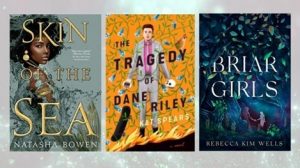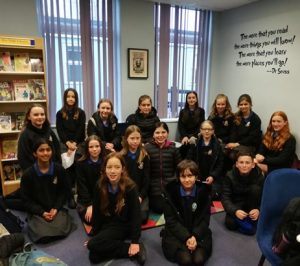Literacy
Literacy evaluation and intervention process (new tab)
Reading Interventions at Weobley High School
In order for interventions to be successful, a purposeful, systematic and personalised approach is essential. At Weobley High School, the Head of English and the SENCO begin by assessing who is behind with reading. This involves triangulating SATs results and personalised information about individual students from their primary school teachers (gathered in June for rising Year 7’s) with Reading data from students’ baseline test in September. Students who are 1-2 years behind their chronological age in reading are then put ‘on watch’. Our experienced English teachers focus on these students during lessons, ensuring that they have books that interest and engage them. We are alert to the possibility of ‘fake reading’, so during reading lessons we ask students to note what page they started on at the beginning of the lesson and where they finished, and look for patterns over time. In these lessons, we also check students’ reading logs: are they finishing books and demonstrating that they understand key ideas? All this leads to individual conversations with struggling students where we offer support to help them find books they will enjoy. For reluctant readers, we have realised that short books that students can finish in 1-2 lessons are hugely beneficial in developing reading confidence and encouraging students to see themselves as readers. We buy books from Laburnum, Badger and Barrington Stoke for this purpose, and have had many students who as a result of reading short books have been ‘switched on’ by reading; several of these have ended up as gaining Silver or Gold reading certificates. English teachers always have a supply of short books and popular reads with them in lessons, and they also have the possibility of sending students to the library to receive personalised guidance. We have devised classroom mini libraries with Mr Alexander’s class housing our shorter reads, Miss Honour the recommended new reads and Miss Harrington-Hay holding our classics and KS5 reads.
For students more than two years behind with their reading, in addition to supporting them in lessons, we put more intensive interventions in place based on their individual needs. One-to-one sessions are the gold standard for effective interventions according to Educational Endowment Foundation research (2018). We decided to develop a team of a dozen trained year 10 volunteers who provide one-to-one weekly ‘Reading Partner’ sessions for about 25 Year 7 students. Volunteers are assisted by the Head of English who evaluates students to determine what the focus for the intervention should be — decoding, comprehension, fluency, vocabulary, EAL, building confidence; or most often, some combination of these. This programme has been effective, with students making progress and it is heart-warming to see the relationship that develops between volunteers and the students they work with, enabling students to have a positive experience of reading.
Students with a reading age more than three years lower than chronological age have Fresh Start lessons with a specialist Fresh Start LSA where the group focus on reading accurately and fluently with good comprehension. It is rooted in phonics and uses age-appropriate decodable texts.
Year 8 students who require additional support with Literacy are taught once a week by Miss Hurds, our Literacy co-ordinator. Here they focus on fluency comprehension. Once this bedrock is in place, students who continue into the year 9 Literacy lessons have three lessons a week of where they read a variety of texts such as the graphic version of Dracula, I am the Minotaur, a re-telling of Jane Eyre and Crossan’s verse poetry to expose them to a range of genres whilst focusing on comprehension.
We monitor the reading progress of Key Stage 3 students through Reading tests twice a year and also utilise feedback from parents and teachers. At risk students are checked during Key Stage 4 to ensure that students leave Weobley High fully literate. Intervention sessions run with a small number of KS4 students where they focus on retrieval practice to support quotation retention of Literature texts.
We have a ‘never-give-up’ approach to students who are behind with their reading: if an intervention doesn’t seem to be having an impact, the Head of English has a one-to-one conversation with the student to explore barriers so that we can try a different approach. Our library is dynamic with a wide range of diverse books to appeal to students and many activities to foster a buzz around reading. We also work hard to provide students with books of their own at home; we buy large numbers of books from charity shops which are gifted to students, or sold at a low cost during parents’ evenings (50p per book). Communication with home is important for success, so we explain to parents what interventions are being put in place for their child, and offer practical and tailored suggestions about how parents might bolster reading progress. Overall, we strongly believe in the need for personalised support for students rather than a blanket ‘one size fits all’ approach.
Paired Reading
Paired reading is an easy and enjoyable way of reading with your child that can improve their ability to understand and increase their confidence in reading. The following short videos from Queens University Belfast explain more about the
method. The final video, from the University of Dundee, shows that the approach is also successful with older readers.
1) What is Paired Reading? – YouTube
2) How to do Paired Reading – YouTube
3) How to Give Praise – YouTube
5) Child’s Perspective – YouTube
Paired Reading (Duolog Reading) – YouTube – This original video by Keith Topping demonstrates that paired reading can be used with any age group.
Below are written instructions for paired reading. We have also provided these instructions in a word document for you to download.
PAIRED READING
HOW TO DO IT
WHAT TO READ
Books, Magazines, Newspapers – from School, Library or Home
Students usually choose what interests them – but be careful they don’t get bored!
Check how hard books are when you choose them (5 finger test)
The 5 finger test – spread 5 fingers on the page, if one word is difficult to read the book may be too hard.
TIME and PLACE
At least 3 times each week for 15-20 minutes
Find the quietest place you can
Sit comfortably side by side – so you both can see the book easily
TALK
Talk together about the book (words and pictures)
Talk before you start, while you are reading, and at the end
Talk to make sure the student understands
MISTAKES
If the student says a word wrong, wait for them to put it right (up to 5 seconds)
If they don’t, say the word correctly, the student repeats it, then carry on reading together.
TUTOR PRAISE
Praise the student for good reading of hard words or longer sections
Praise the student for putting their own mistake right before you correct
Praise very often, in different words – and smile and sound as if you mean it!
READING TOGETHER
On hard books and hard bits, Read Together
Match the reading speed of the student
Point to words only if you really need to
READING ALONE
Agree on a signal for the student to read alone (tap, knock, nudge)
On the signal, praise the student and stop reading together
When the student makes a mistake . . .
If they put it right in 4-5 seconds, praise them
If not, read the word, the student repeats it, and then go back to reading together
The student signals again when they are ready to read alone, and so on . .
Instructions for Paired Reading
Book club
Junior book club – Monday lunchtime
Senior book club – Tuesday lunchtime.
Senior book club have enjoyed reading re-tellings of classic tales such as Hamlet, The Secret Garden, The Outsiders, Rumpelstiltskin, Jane Eyre to name but a few.

Reading Ambassadors
The role involves a lot of exciting things such as:
promoting a reading culture across our school and nursery,
promoting World Book Day.
Participating in the Carnegie Competition
helping in the library,
choosing and sorting books,
visits to Waterstones to choose new books,
sharing ideas,
storytelling in the nursery,
keeping the library tidy,
attending meetings with our librarian,
presenting in assemblies,
helping across the nursery and school with reading,

